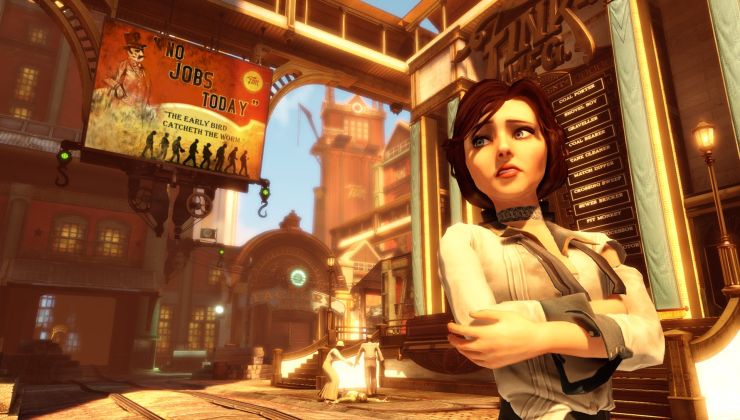63 Days is a new action strategy game coming from developer Destructive Creations who previously made War Mongrels and Ancestors Legacy. 63 Days is about brotherhood and the fight to regain independence against overwhelming odds in the 1944 occupied Warsaw, Poland.
They announced the game earlier this month, and over email they mentioned to me "We're working hard to optimize the game for Steamdeck. That means we're improving things like text scaling, controller support, and overall performance." which is great to see!
It’s an isometric real-time tactics game that follows in the footsteps of Destructive Creations' previous release, War Mongrels, building upon its gameplay mechanics. Ready for those of you looking to scratch that tactical itch playing a proven formula with quality graphics, fresh gameplay elements, and music produced by the legendary Adam Skorupa.

Direct Link
You can follow it on Steam. It's planned to release later this year. Looks good!
Going by the title, it seems to be about the [Warsaw Uprising](https://en.wikipedia.org/wiki/Warsaw_Uprising).Yeah and uhhhh safe to say you won't take back occupied Poland, nor Warsaw.
The Warsaw Uprising of 44 is one of the most tragic bits in our recent(ish) history, still remembered and deeply honored in Poland. It is not part of the history lessons in most countries so it is often forgotten as many failed insurrections are.
But to us Poles it is important to honor the sacrifice of the civilians that were part of the uprising as well as understand it was the last ditch attempt to get at least partly liberated on our own, without help from USSR or the Western forces.
It is also one of the reasons why Polish citizens understand the dramatic situation in Ukraine so well, especially when it comes to civilian casualties.
Despite a few games already covering The Warsaw Uprising it is safe to say that it failed to get a quality video game coverage so far. Perhaps this title will be different.
This classic Polish movie is a recommended watch on The Warsaw Uprising: https://www.youtube.com/watch?v=VTbpH6356xI
Not to be confused with Warsaw Ghetto Uprising which happened in 43. On a smaller scale but no less tragic of course.
(..)Yeah none of this is true. Get out of the room, Russian troll. Either you are spewing Russian propaganda or repeating it.
Poland is a great nation full of strong people. Today, it's one of the most anti-Marxist countries in Europe.An understandable if unfortunate reaction to their history. Pity it isn't also one of the most anti-Fascist countries in Europe, which would also have been an understandable reaction to their history.
Poland is a great nation full of strong people. Today, it's one of the most anti-Marxist countries in Europe.An understandable if unfortunate reaction to their history. Pity it isn't also one of the most anti-Fascist countries in Europe, which would also have been an understandable reaction to their history.
Fascism is actually just the dialectical inversion of Marxism. In both fascism and Marxism, the state is God - the only difference is what you're collectivizing. They're almost the same ideology. China is the dialectical synthesis of Marxism and fascism to make neoliberal communism.
Marxism as such has almost no political programme. Marx was almost entirely a critic of capitalism. What inklings of a political project he ever talked about were ambiguous, and probably unworkable, but far from aspiring to the state as God. People who consider themselves Marxists in the sense that they find his criticisms of capitalism powerful and compelling have had wildly varying ideas about just what to replace it with. Marx didn't get on well with Anarchists, but most modern social Anarchists draw on the Marxist critique of capitalism, and they certainly have no interest in a state being God. So despite throwing around terms like "dialectical", you're saying one of those facile things that shows you don't actually know anything about the topic.Poland is a great nation full of strong people. Today, it's one of the most anti-Marxist countries in Europe.An understandable if unfortunate reaction to their history. Pity it isn't also one of the most anti-Fascist countries in Europe, which would also have been an understandable reaction to their history.
Fascism is actually just the dialectical inversion of Marxism. In both fascism and Marxism, the state is God - the only difference is what you're collectivizing. They're almost the same ideology. China is the dialectical synthesis of Marxism and fascism to make neoliberal communism.
If you want to say Soviet-style socialism, you're still wrong, but the two are at any rate both authoritarian so that's something. But whatever the philosophical relationship between the two, it is clearly possible to be against one and not against the other.
As to China . . . "dialectical synthesis" sounds really cute, but it rarely means a whole lot, and certainly not in this case. China has no real relationship to fascism, and would have no impulse to synthesize it with anything. What China has is mercantile traditions, Confucianism, and the scholarly examination system. It brought all that stuff back; a bit of Communist influence remains, in a feeling that while markets are fine for plenty of stuff they aren't a substitute for decisions and planning--although, I think that's a natural position for Confucians to take. The mercantile traditions are running the sort of background economy, and the Communist Party is a fairly Confucian thing that headhunts talent like a massive HR department--or, like a modern reconstitution of the old imperial scholarly examination system. The Party comes up with strategies and bends the economy towards them. The result is fairly capitalist, but absolutely not neoliberal. The Chinese have markets, but intervene in them like anything; that's why they've succeeded so well.
Fascism is actually just the dialectical inversion of Marxism. In both fascism and Marxism, the state is God - the only difference is what you're collectivizing. They're almost the same ideology. China is the dialectical synthesis of Marxism and fascism to make neoliberal communism.One of my favorite bloggers put it more clearly. Fascism and Communism (not Marxism, which as PLG notes is more philosophical than political) are opposites on the political spectrum of Socialism. What's the primary difference? In simplified terms, the ownership of the resources. In Communism, the resources are owned by the state. In Fascism, the resources are owned by private (corporate) interests. Otherwise, both systems tend to be dictatorial in nature and infringe on personal sovereignty.
I have brought out the arm chair philosophers.Says a guy drive-by citing Socrates, Plato, Hegel, Gnosticism and on and on. Whatever.
Marx is talking about seizing the means of production of man via seizing the means of production of culture. Culture makes man and man makes culture, and the snake eats its own tail. Marxism is in fact just the most currently relevant gnostic religion. It's a theosophy, not a philosophy. To understand this, read Socrates and Plato, then the Torah (particularly Genesis with its warning against gnosis), then the Corpus Hermeticum, then Hegel, then Marx, and then keep going to Antonio Gramsci, Herbert Marcuse, Angela Davis, Gale Rubin, and Kimberle Crenshaw. Starting with Plato in contrast to Socrates position of forms of knowledge, everything afterward except Genesis is gnostic.Wow, that's all amazingly pretentious. And incredibly wrong. To squash all that stuff together like that takes a stubborn refusal to grapple with the specifics of what any of them are actually talking about.
I have brought out the arm chair philosophers.Says a guy drive-by citing Socrates, Plato, Hegel, Gnosticism and on and on. Whatever.
Marx is talking about seizing the means of production of man via seizing the means of production of culture. Culture makes man and man makes culture, and the snake eats its own tail. Marxism is in fact just the most currently relevant gnostic religion. It's a theosophy, not a philosophy. To understand this, read Socrates and Plato, then the Torah (particularly Genesis with its warning against gnosis), then the Corpus Hermeticum, then Hegel, then Marx, and then keep going to Antonio Gramsci, Herbert Marcuse, Angela Davis, Gale Rubin, and Kimberle Crenshaw. Starting with Plato in contrast to Socrates position of forms of knowledge, everything afterward except Genesis is gnostic.Wow, that's all amazingly pretentious. And incredibly wrong. To squash all that stuff together like that takes a stubborn refusal to grapple with the specifics of what any of them are actually talking about.
I can already tell that you're dug in on the issue and there's no point in trying to change your mind. You're being deliberately obtuse and trying to confuse the lineage, likely because you know what I've said is true, but you believe in the ideology nonetheless. Ideology is nothing more than secular religion. It's time for you to be agnostic. I don't have any interest in debating someone who does not want to understand.








 How to set, change and reset your SteamOS / Steam Deck desktop sudo password
How to set, change and reset your SteamOS / Steam Deck desktop sudo password How to set up Decky Loader on Steam Deck / SteamOS for easy plugins
How to set up Decky Loader on Steam Deck / SteamOS for easy plugins
See more from me